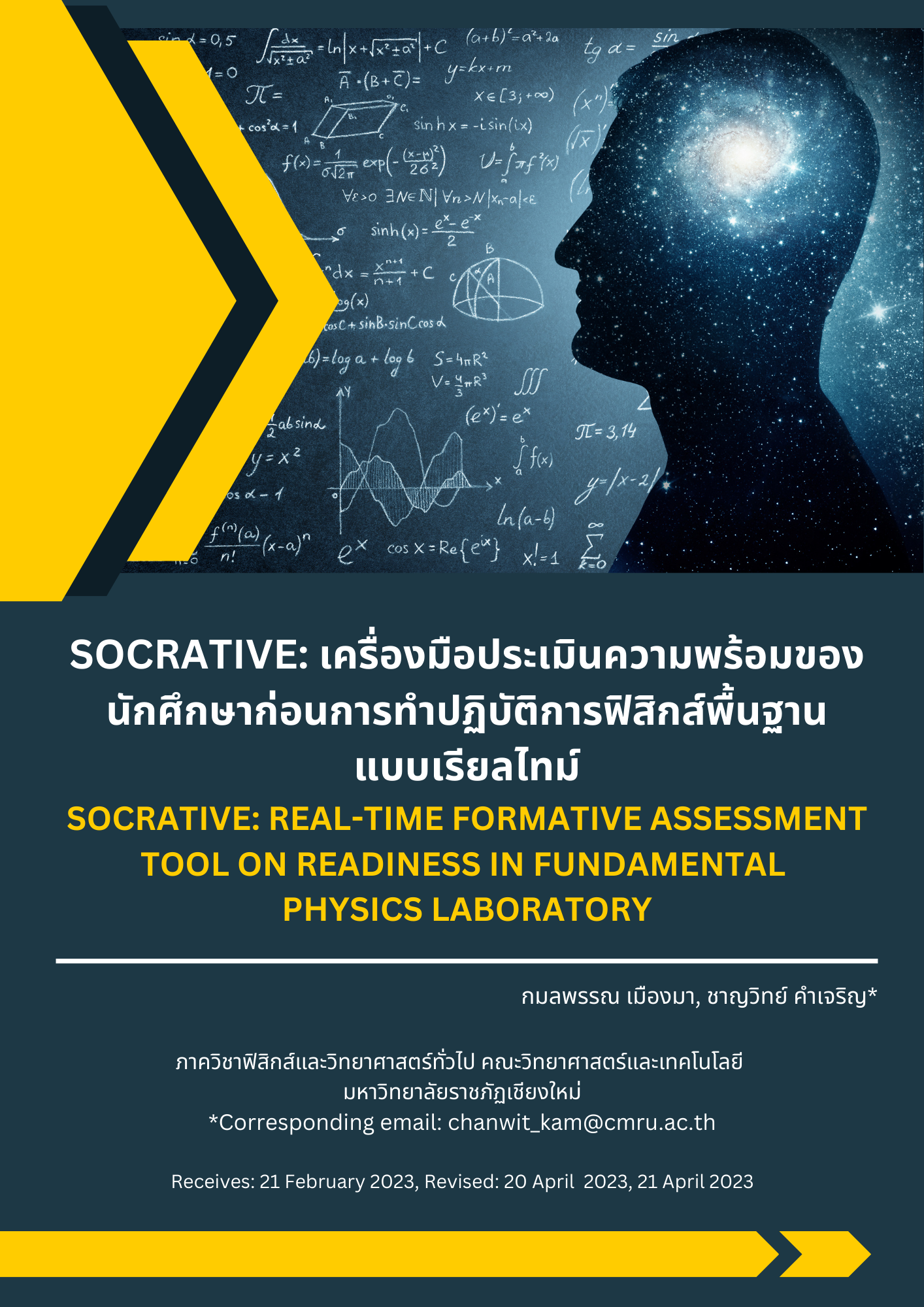Socrative: เครื่องมือประเมินความพร้อมของนักศึกษาก่อนการทำปฏิบัติการ ฟิสิกส์พื้นฐานแบบเรียลไทม์
คำสำคัญ:
Socrative, ปฏิบัติการฟิสิกส์พื้นฐาน, เครื่องมือประเมินความพร้อมบทคัดย่อ
บทความวิจัยนี้เป็นการวิจัยเชิงสำรวจมีวัตถุประสงค์เพื่อศึกษาการใช้ Socrative เป็นเครื่องมือประเมินความพร้อมของนักศึกษาก่อนการทำปฏิบัติการฟิสิกส์พื้นฐาน และศึกษาความพึงพอใจที่มีต่อการใช้ Socrative กลุ่มเป้าหมายคือ นักศึกษาชั้นปีที่ 1 จำนวน 80 คน ที่ลงทะเบียนเรียนในรายวิชาฟิสิกส์พื้นฐาน ภาคเรียนที่ 2 ปีการศึกษา 2564 และ ภาคเรียนที่ 1 ปีการศึกษา 2565 เครื่องมือที่ใช้ในการวิจัยคือ แบบทดสอบก่อนการทำปฏิบัติการฟิสิกส์พื้นฐานโดยใช้ Socrative จำนวน 10 ปฏิบัติการ ปฏิบัติการละ 10 ข้อ รวม 100 ข้อ และแบบสำรวจความพึงพอใจที่มีต่อการใช้ Socrative สถิติที่ใช้ในการวิเคราะห์คือ ค่าเฉลี่ย ค่าร้อยละ และส่วนเบี่ยงเบนมาตรฐาน โดยวิเคราะห์ผลจากคำตอบของนักศึกษาที่ตอบแบบทดสอบซึ่งแบ่งกลุ่มเนื้อหาออกเป็น 5 ด้านคือ ด้านที่ 1 ความเข้าใจเกี่ยวกับจุดประสงค์ของการทำปฏิบัติการ ด้านที่ 2 ความเข้าใจเกี่ยวกับเนื้อหาที่เกี่ยวข้องกับปฏิบัติการ ด้านที่ 3 ความเข้าใจเกี่ยวกับการแยกแยะตัวแปรและการคำนวณ ด้านที่ 4 ความเข้าใจเกี่ยวกับการใช้เครื่องมือ ด้านที่ 5 ความเข้าใจเกี่ยวกับการจัดกระทำกับข้อมูลและการวิเคราะห์ผลการทดลอง และคำตอบจากแบบสำรวจความพึงพอใจ
ผลการวิจัยพบว่ากลุ่มเป้าหมาย มีคะแนนเฉลี่ยน้อยที่สุดคือ ด้านที่ 5 ซึ่งเป็นเนื้อหาที่มีความยากมากที่สุด มีคะแนนเฉลี่ยมากที่สุดคือ ด้านที่ 1 ซึ่งเป็นเนื้อหาส่วนที่ง่ายที่สุด และนักศึกษาให้ผลตอบรับในเชิงบวกที่ระดับคะแนนเฉลี่ย 4.64±0.58 และผลตอบรับในเชิงลบที่ระดับคะแนนเฉลี่ย 1.81±1.15 แปรผลได้ว่านักศึกษามีความพึงพอใจมากที่สุด ผลที่ได้แสดงให้เห็นว่า Socrative มีความเหมาะสมสำหรับใช้เป็นเครื่องมือประเมินความพร้อมก่อนการทำปฏิบัติการฟิสิกส์พื้นฐาน
เอกสารอ้างอิง
Garcia-Luque, E. et al. (2004). Using a laboratory simulator in the teaching and study of chemical processes in estuarine systems. Computers & Education. 43(1-2), 81-90.
Guarascio, A.J. et al. (2017). Evaluation of students’ perceptions of the Socrative application versus a traditional student response system and its impact on classroom engagement. Currents in Pharmacy Teaching and Learning. 9(5), 808-812.
Leung, A. C. K., Pour, B. H., Reynolds, D., & Stanislaw, J. (2015). New assessment process in an introductory undergraduate physics laboratory: an exploration on collaborative learning. Assessment & Evaluation in Higher Education. 1(13), 1-13.
Limniou, M., Papadopoulos, N., & Whitehead, C. (2009). Integration of simulation into pre-laboratory chemical course: Computer cluster versus WebCT. Computers & Education. 52(1), 45-52.
Lyle, K. S., & Robinson, W. R. (2002). An Action Research Report: Improving Pre-Laboratory Preparation of First-Year University Chemistry Students. Chemical Education Today. 76(6), 663-665.
Mazur, E., & Hilborn, R.C. (1997). Peer Instruction: A User's Manual. Physics Today. 50(4), 68-69.
Mubarok, H., Lutfiyah, A., Kholiq, A., Suprapto, N., & Putri, N. P. (2017). The performance assessment of undergraduate students in physics laboratory by using guided inquiry. Journal of Physics Conference Series. 997(012039), 1-11.
Pogacnik L., & Cigic, B. (2006). How To Motivate Students To Study before They Enter the Lab. Journal of Chemical Education. 83(7), 1094-1098.
Rollnick, M. et al. (2001). Improving pre-laboratory preparation of first year university chemistry students. International Journal of Science Education. 23(10), 1053-1071.
Sripan, T., & Sujivorakul, C. (2021). Using Engagement Activity to Enhance the Intention to Persist of Vocational Student. Vocational Education Innovation and Research Journal. 5(1), 22-31.
Winberg, T. M., & Berg, C. A. R. (2007). Students’ Cognitive Focus During a Chemistry Laboratory Exercise: Effects of a Computer-Simulated Prelab. Journal of Research in Science Teaching. 44(8), 1108-1113.
Wuttiprom, S. et al. (2017). Using Plickers Cooperate with Peer Instruction to Promote Students' Discussion in Introductory Physics Course. Universal Journal of Educational Research. 5(11), 1955-1961.

ดาวน์โหลด
เผยแพร่แล้ว
รูปแบบการอ้างอิง
ฉบับ
ประเภทบทความ
สัญญาอนุญาต
ลิขสิทธิ์ (c) 2023 วารสารสหวิทยาการเพื่อการพัฒนา มหาวิทยาลัยราชภัฏอุตรดิตถ์

อนุญาตภายใต้เงื่อนไข Creative Commons Attribution-NonCommercial-NoDerivatives 4.0 International License.
แนวคิดและทัศนะในบทความเป็นความรับผิดชอบของผู้เขียนบทความ การนำบทความหรือส่วนหนึ่งของบทความไปตีพิมพ์เผยแพร่ ให้อ้างอิงแสดงที่มา และข้อมูลเกี่ยวกับผู้เขียนบทความ



